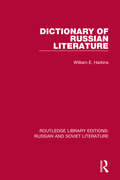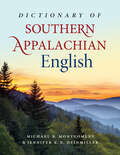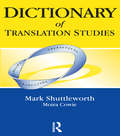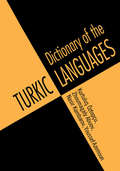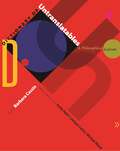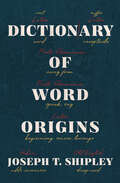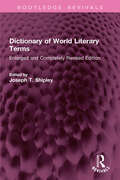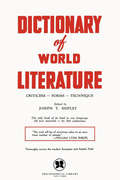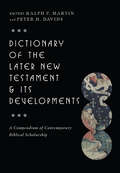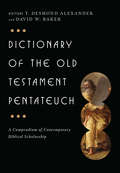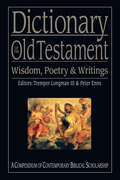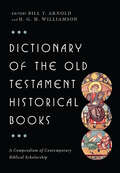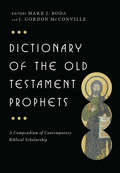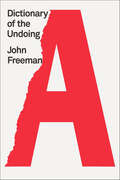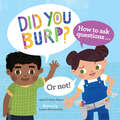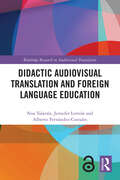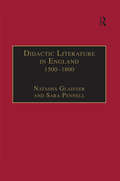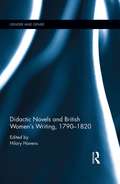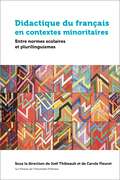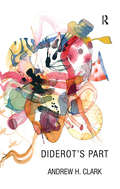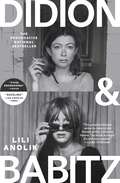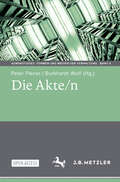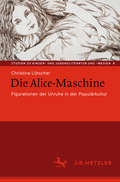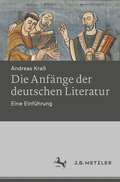- Table View
- List View
Dictionary of Russian Literature (Routledge Library Editions: Russian and Soviet Literature #3)
by William E. HarkinsThis book, first published in 1957, provides essential information on the entire field of Russian literature, as well as a great deal on literary criticism, journalism, philosophy, theatre and related subjects. Russian literary tradition has tended to blur the distinctions between social and political criticism on one hand, and literary criticism on the other, and even, to an extent, the distinction between philosophy and literature. Although intended primarily as a reference work, this book also contains much critical analysis.
Dictionary of Southern Appalachian English
by Michael B. Montgomery & Jennifer K. N. HeinmillerThe Dictionary of Southern Appalachian English is a revised and expanded edition of the Weatherford Award–winning Dictionary of Smoky Mountain English, published in 2005 and known in Appalachian studies circles as the most comprehensive reference work dedicated to Appalachian vernacular and linguistic practice. Editors Michael B. Montgomery and Jennifer K. N. Heinmiller document the variety of English used in parts of eight states, ranging from West Virginia to Georgia—an expansion of the first edition's geography, which was limited primarily to North Carolina and Tennessee—and include over 10,000 entries drawn from over 2,200 sources. The entries include approximately 35,000 citations to provide the reader with historical context, meaning, and usage. Around 1,600 of those examples are from letters written by Civil War soldiers and their family members, and another 4,000 are taken from regional oral history recordings. Decades in the making, the Dictionary of Southern Appalachian English surpasses the original by thousands of entries. There is no work of this magnitude available that so completely illustrates the rich language of the Smoky Mountains and Southern Appalachia.
Dictionary of Translation Studies
by Mark ShuttleworthPublished at a time of unprecedented growth of interest in translation, the Dictionary of Translation Studies aims to present the insights of a number of different approaches to translation in an unbiased, non-partisan way. With more than 300 articles, this essential volume provides the reader with a snapshot of a rapidly developing discipline, based on work produced in serveral languages. With a clear, easy-to-follow layout, the Dictionary provides a comprehensive and highly accessible survey of key terms and concepts (such as Abusive Translation, Equivalence, Informationsangebot, Minimax Principle, Texteme and Thick Translation), types of activity (Autotranslation, Dubbing, Signed Language Interpreting), and schools and approaches (Leipzig School, Manipulation School, Nitra School). Each term is presented within the context in which it first occurred and is given a definition which is both clear and informative. Major entries include a discussion of relevant viewpoints as well as comments on how the usage and application of the term have developed subsequent to its coining. In addition, all entries provide suggestions for further reading, and there is an extensive bibliography included at the end. This is an indispensable tool for anyone studying or teaching translation at university level.
Dictionary of Turkic Languages
by Zhoumagaly Abuov Nasir Kambarov Youssef AzemounThis multi-language dictionary covers the eight major Turkic languages: Turkish, Azerbaijani, Turkmen, Uzbek, Uighur, Kazakh, Kirgiz, and Tatar. 2000 headwords in English are translated into each of the eight Turkic languages. Words are organized both alphabetically and topically. Original script and Latin transliteration are provided for each language. For ease of use, alphabetical indices are also given for the eight languages. This is an invaluable reference book for both students and learners and for those enaged in international commerce, research, diplomacy and academic and cultural exchange.
Dictionary of Untranslatables: A Philosophical Lexicon (Translation/Transnation #35)
by Barbara CassinCharacters in some languages, particularly Hebrew and Arabic, may not display properly due to device limitations. Transliterations of terms appear before the representations in foreign characters.This is an encyclopedic dictionary of close to 400 important philosophical, literary, and political terms and concepts that defy easy—or any—translation from one language and culture to another. Drawn from more than a dozen languages, terms such as Dasein (German), pravda (Russian), saudade (Portuguese), and stato (Italian) are thoroughly examined in all their cross-linguistic and cross-cultural complexities. Spanning the classical, medieval, early modern, modern, and contemporary periods, these are terms that influence thinking across the humanities. The entries, written by more than 150 distinguished scholars, describe the origins and meanings of each term, the history and context of its usage, its translations into other languages, and its use in notable texts. The dictionary also includes essays on the special characteristics of particular languages--English, French, German, Greek, Italian, Portuguese, Russian, and Spanish.Originally published in French, this one-of-a-kind reference work is now available in English for the first time, with new contributions from Judith Butler, Daniel Heller-Roazen, Ben Kafka, Kevin McLaughlin, Kenneth Reinhard, Stella Sandford, Gayatri Chakravorty Spivak, Jane Tylus, Anthony Vidler, Susan Wolfson, Robert J. C. Young, and many more.The result is an invaluable reference for students, scholars, and general readers interested in the multilingual lives of some of our most influential words and ideas.Covers close to 400 important philosophical, literary, and political terms that defy easy translation between languages and culturesIncludes terms from more than a dozen languagesEntries written by more than 150 distinguished thinkersAvailable in English for the first time, with new contributions by Judith Butler, Daniel Heller-Roazen, Ben Kafka, Kevin McLaughlin, Kenneth Reinhard, Stella Sandford, Gayatri Chakravorty Spivak, Jane Tylus, Anthony Vidler, Susan Wolfson, Robert J. C. Young, and many moreContains extensive cross-references and bibliographiesAn invaluable resource for students and scholars across the humanities
Dictionary of Word Origins (Barnes And Noble Digital Library)
by Joseph T ShipleyThis extensive reference volume presents the etymological history of thousands of English words. The story of how words come to be is the story of how humans think, and how we fashion our civilizations. Words can be the product of long and intertwining histories, migrations from other languages, or new coinages of science or slang. This diversity of origins is part of what gives the English language its beauty and power. In Dictionary of Word Origins, etymologist Joseph T. Shipley provides a fascinating window into the evolution of modern English, from the onomatopoetic aspect of &“abash&” to the animalistic origins of &“zodiac.&”
Dictionary of World Literary Terms: Enlarged and Completely Revised Edition (Routledge Revivals)
by Joseph T. ShipleyFirst published in 1970, Dictionary of World Literary Terms brings together in one volume authoritative definitions of literary terms, forms and techniques, figures of speech and detailed notes on the history and development of the literatures and literary movements of the world. Arranged in alphabetical order for easy use, the entries range from anti-hero to zeugma, from classicism to the New Criticism, and from esoteric or archaic terms to contemporary theatre and poetry. This book will be indispensable for writers, students, scholars, researchers, librarians and everyone who has a literary curiosity.
Dictionary of World Literature
by Joseph T. ShipleyThis book gives you the background of literature and the theatre. It defines, clearly and crisply, the terms used in the literary arts and in their criticism. It outlines the history of criticism in the various lands. It explains the various literary schools, varieties of play, methods of theatre production; types of poetry, fiction, history, biography--the puppet show; the dance: Providing A Rich Compendium Of All You Need To Know When You Approach A Novel Or A Poem Or A Play. This is an amazingly thorough reference work which must prove of enormous value to the theatre worker, professional or scholar everywhere; for the librarian, teacher, and critic, an essential tool. --George Freedley, President, Theatre Library Association. To the delight and relief of librarians and students a gap in the reference collection has been bridged successfully, at last! --William A. Fitzgerald, Past President, Catholic Library Association.
Dictionary of the Later New Testament & Its Developments: A Compendium of Contemporary Biblical Scholarship (The IVP Bible Dictionary Series)
by Ralph P. Martin Peter H. DavidsChristianity Today'sDictionary of the Later New Testament & Its DevelopmentsDictionary of the Later New Testament & Its DevelopmentsDictionary of Jesus and the GospelsDictionary of Paul and His Letters
Dictionary of the Old Testament: A Compendium of Contemporary Biblical Scholarship (The IVP Bible Dictionary Series)
by T. Desmond AlexanderA 2003 LOGOS Book Award WinnerAn ECPA 2003 Gold Medallion Finalist The first five books of the Old Testament lay the foundation on which the rest of Scripture stands. Its great themes, epochal events and towering figures set down vectors on which the biblical story is played out. The very shape of the rest of the Old Testament would collapse were the Penteteuch to be removed. The structure of New Testament thought would be barely intelligible without it. Here we meet the great ancestral figures of Israel--Abraham, Isaac and Jacob--and the towering figure of Moses, whose presence dominates four of these five books. The creative act of God, the paradisal garden, the exile of Adam and Eve, the judgment of the great flood, the call of Abraham from among the nations, the covenant of Abraham, the exodus from Egypt, the giving of the law at Sinai, the plan of the tabernacle, the varied experiences of Israel in the wilderness, and the announcement of the covenant blessings and curses--all of these and more contribute to a work of world-formative power. This dictionary explores the major themes and contours of the Pentateuch. Behind and beneath the grandeur of the Pentateuch, issues of historicity have both puzzled and beckoned. But whereas in the mid-twentieth century many English-speaking scholars were confident of archaeological support for the patriarchal accounts, the climate has now changed. In the most extreme cases, some contemporary scholars have radically challenged the antiquity of the ancestral stories, arguing for their final composition even as late as the Hellenistic era. This dictionary examines and weighs the historical issues and poses possible solutions. The documentary hypothesis, the former reigning critical consensus, is now widely rumored to be on life support with no heir apparent. Meanwhile, conservative scholars reconsider what indeed a claim to Mosaic authorship should entail. This dictionary offers an assessment of the array of questions surrounding these issues and considers some possible ways forward for evangelical scholarship. At the same time, there has been a fruitful turning to the nature, message and art of the received text of the Pentateuch. Literary studies of brief episodes, sprawling sagas, complex narrative and even the fivefold composition of the Pentateuch itself have delivered promising and exciting results. This dictionary offers both appreciative panoramas and close-up assessments of these developments and their methods. The Dictionary of the Old Testament: Pentateuch is the first in a four-volume series covering the text of the Old Testament. Following in the tradition of the four award-winning IVP dictionaries focused on the New Testament and its background, this encyclopedic work is characterized by close attention to the text of the Old Testament and the ongoing conversation of contemporary scholarship. In exploring the major themes and issues of the Pentateuch, editors T. Desmond Alexander and David W.Baker, with an international and expert group of scholars, inform and challenge through authoritative overviews, detailed examinations and new insights from the world of the ancient Near East. The Dictionary of the Old Testament: Pentateuch is designed to be your first stop in the study and research of the Pentateuch, on which the rest of the Bible is built. Note: Because this ebook is large, please allow a little extra time to download after purchase.
Dictionary of the Old Testament: A Compendium of Contemporary Biblical Scholarship (The IVP Bible Dictionary Series)
by Tremper Longman IIIChristianity TodayThe Old Testament books of wisdom and poetry carry themselves differently from those of the Pentateuch, the histories or the prophets. The divine voice does not peal from Sinai, there are no narratives carried along by prophetic interpretation nor are oracles declaimed by a prophet. Here Scripture often speaks in the words of human response to God and God's world. The hymns, laments and thanksgivings of Israel, the dirge of Lamentations, the questionings of Qohelet, the love poetry of the Song of Songs, the bold drama of Job and the proverbial wisdom of Israel all offer their textures to this great body of biblical literature. Then too there are the finely crafted stories of Ruth and Esther that narrate the silent providence of God in the course of Israelite and Jewish lives.Dictionary of the Old Testament: Wisdom, Poetry Writings.Coverage of each biblical book includes an introduction to the book itself as well as separate articles on its ancient Near Eastern background and its history of interpretation. Additional articles amply explore the literary dimensions of Hebrew poetry and prose, including acrostic, ellipsis, inclusio, intertextuality, parallelism and rhyme. And there are well-rounded treatments of Israelite wisdom and wisdom literature, including wisdom poems, sources and theology. In addition, a wide range of interpretive approaches is canvassed in articles on hermeneutics, feminist interpretation, form criticism, historical criticism, rhetorical criticism and social-scientific approaches.Dictionary of the Old Testament: Wisdom, Poetry WritingsTremper Longman III and Peter E. Enns edit this collection of 148 articles by 90 contributors on Job, Psalms, Proverbs, Ecclesiastes, Song of Songs, Lamentations, Ruth and Esther.
Dictionary of the Old Testament: Historical Books (The IVP Bible Dictionary Series)
by Bill T. ArnoldDictionary of the Old Testament: Historical BooksDictionary of the Old Testament: PentateuchDictionary of the Old Testament: Historical BooksDOTHB.DOTHBDOTHBDOTHB
Dictionary of the Old Testament: Prophets (The IVP Bible Dictionary Series)
by Mark J. Boda2013 ECPA Book Award finalistDictionary of the Old Testament: Prophets
Dictionary of the Undoing
by John FreemanFor John Freeman—literary critic, essayist, editor, poet, “one of the preeminent book people of our time” (Dave Eggers)—it is the rare moment when words are not enough. But in the wake of the election of 2016, words felt useless, even indulgent. Action was the only reasonable response. He took to the streets in protest, and the sense of community and collective conviction felt right. But the assaults continued—on citizens’ rights and long-held compacts, on the core principles of our culture and civilization, and on our language itself. Words seemed to be losing the meanings they once had and Freeman was compelled to return to their defense. The result is his Dictionary of the Undoing.From A to Z, “Agitate” to “Zygote,” Freeman assembled the words that felt most essential, most potent, and began to build a case for their renewed power and authority, each word building on the last. The message that emerged was not to retreat behind books, but to emphatically engage in the public sphere, to redefine what it means to be a literary citizen.With an afterword by Valeria Luiselli, Dictionary of the Undoing is a necessary, resounding cri de coeur in defense of language, meaning, and our ability to imagine, describe, and build a better world.
Did You Burp?: How to Ask Questions (or Not!)
by April Pulley SayreAsking questions may seem like it comes naturally, but it's actually a learned social skill. How do questions and answers work? What makes a good question--and what makes a rude one? Who cares about questions?This helpful how-to guide teaches kids what a question is, when to ask one, and how to form one. Friendly tips and pointers ("Keep it short!" "Show interest!") help kids keep their questions appropriate and on point. Above all, the book encourages readers to keep on asking questions--the beginning of learning about the world.
Didactic Audiovisual Translation and Foreign Language Education (Routledge Research in Audiovisual Translation)
by Noa Talaván Jennifer Lertola Alberto Fernández-CostalesThis book offers an updated and comprehensive view of the possibilities of didactic audiovisual translation (didactic AVT or DAT) in language education, by presenting the methodological bases that support its pedagogical use at all levels of linguistic proficiency, as well as in different educational stages and contexts. The volume defines the main didactic AVT modes, accompanied by general recommendations, specific guidelines, complete sample lesson plans and sequences, and models for assessment. Didactic AVT is described in this book as an effective pedagogical resource that can improve students’ language competence and trigger core factors in education, such as learners’ motivation and engagement in language classes, their cognitive processes, their creativity, and the active use of ICTs in the classroom. From the perspective of educators, DAT provides a pool of multipurpose resources that may help them to enrich their classes from a pedagogical, linguistic and intercultural standpoint. This book will be a valuable resource for graduate students, scholars, and practitioners in translation studies, particularly those interested in audiovisual translation and foreign language learning.
Didactic Audiovisual Translation and Foreign Language Education (Routledge Research in Audiovisual Translation)
by Noa Talaván Jennifer Lertola Alberto Fernández-CostalesThis book offers an updated and comprehensive view of the possibilities of didactic audiovisual translation (didactic AVT or DAT) in language education, by presenting the methodological bases that support its pedagogical use at all levels of linguistic proficiency, as well as in different educational stages and contexts.The volume defines the main didactic AVT modes, accompanied by general recommendations, specific guidelines, complete sample lesson plans and sequences, and models for assessment. Didactic AVT is described in this book as an effective pedagogical resource that can improve students’ language competence and trigger core factors in education, such as learners’ motivation and engagement in language classes, their cognitive processes, their creativity, and the active use of ICTs in the classroom. From the perspective of educators, DAT provides a pool of multipurpose resources that may help them to enrich their classes from a pedagogical, linguistic and intercultural standpoint.This book will be a valuable resource for graduate students, scholars, and practitioners in translation studies, particularly those interested in audiovisual translation and foreign language learning.
Didactic Literature in England 1500–1800: Expertise Constructed
by Sara PennellRanging from music to astronomy, gardening to the Bible, this essay collection is the first multi-disciplinary volume to examine a kind of text that was a staple of early modern English publishing: the how-to book. It tackles a wide range of subjects - grammars, music books, gardening manuals, teach-yourself book-keeping - while highlighting the commonalities of diverse texts as didactic works, and situating this material in wider intellectual and material contexts. An introductory essay explores the uses of didactic texts in early modern culture, evaluates their relationships with other literary forms, and establishes the significance of such texts within the cultural history of the period. There follow contributions by an international group of scholars from a broad range of disciplines, including the history of science, literature, lingustics, and musicology. The volume addresses the important issue of how texts that tend to be regarded today as 'non-literary' functioned within early modern literature. It also evaluates relationships between textual prescription and actual practices, and the early modern conception of experience as opposed to knowledge, that presently concern social and cultural historians and historians of science. Drawing attention to non-fictional, didactic texts as opposed to the imaginative and political writings that have been its focus until now, Didactic Literature in England 1500-1800 adds a new dimension to the study of reading, readership and publishing. All in all, it constitutes a substantial contribution to histories of knowledge, of educational processes and practices, and to the history of the book in early modern England.
Didactic Novels and British Women's Writing, 1790-1820 (Gender and Genre)
by Hilary HavensTracing the rise of conduct literature and the didactic novel over the course of the eighteenth century, this book explores how British women used the didactic novel genre to engage in political debate during and immediately after the French Revolution and the Napoleonic Wars. Although didactic novels were frequently conventional in structure, they provided a venue for women to uphold, to undermine, to interrogate, but most importantly, to write about acceptable social codes and values. The essays discuss the multifaceted ways in which didacticism and women’s writing were connected and demonstrate the reforming potential of this feminine and ostensibly constricting genre. Focusing on works by novelists from Jane West to Susan Ferrier, the collection argues that didactic novels within these decades were particularly feminine; that they were among the few acceptable ways by which women could participate in public political debate; and that they often blurred political and ideological boundaries. The first part addresses both conservative and radical texts of the 1790s to show their shared focus on institutional reform and indebtedness to Mary Wollstonecraft, despite their large ideological range. In the second part, the ideas of Hannah More influence the ways authors after the French revolution often linked the didactic with domestic improvement and national unity. The essays demonstrate the means by which the didactic genre works as a corrective not just on a personal and individual level, but at the political level through its focus on issues such as inheritance, slavery, the roles of women and children, the limits of the novel, and English and Scottish nationalism. This book offers a comprehensive and wide-ranging picture of how women with various ideological and educational foundations were involved in British political discourse during a time of radical partisanship and social change.
Didactique du français en contextes minoritaires: Entre normes scolaires et plurilinguismes (Éducation)
by Joël Thibeault et Carole FleuretDans Didactique du français en contextes minoritaires, des chercheurs établissent des ancrages théoriques en sociologie, en linguistique, en psychologie cognitive et en éducation, pour faire état de la recherche et de la théorie sur la didactique du français en contextes francophones minoritaires. Au fil des chapitres, les auteurs mettent en évidence la nécessité d’un enseignement du français qui soit signifiant et qui, en ce sens, soit pensé en fonction des caractéristiques qui sont propres aux populations scolaires qui évoluent dans les contextes francophones minoritaires du Canada. Dans cet ouvrage privilégiant une approche humaniste, les auteurs posent les jalons d’une didactique du français qui, afin de permettre aux apprenants de s’approprier les normes scolaires qui favoriseront leur épanouissement en société, s’inspire de leurs réalités, de leurs trajectoires, de leurs histoires, de leurs forces et des défis qu’ils rencontrent.
Diderot's Part
by Andrew H. ClarkDrawing upon the rich heterogeneity of Denis Diderot's texts-whether scientific, aesthetic, philosophic or literary-Andrew Clark locates and examines an important epistemological shift both in Diderot's oeuvre and in the eighteenth century more generally. In Western Europe during the 1750s, the human body was reconceptualized as physiologists began to emphasize the connections, communication, and relationships among relatively autonomous somatic parts and an animated whole. This new conceptualization was part of a larger philosophical and epistemological shift in the relationship of part to whole, as discovered in that of bee to swarm; organ to body; word to phrase; dissonant chord to harmonic progression; article to encyclopedia; and individual citizen to body politic. Starting from Diderot's concept of the body as elaborated from the physiological research and speculation of contemporaries such as Haller and Bordeu, the author investigates how the logic of an unstable relationship of part to whole animates much of Diderot's writing in genres ranging from art criticism to theatre to philosophy of science. In particular, Clark examines the musical figure of dissonance, a figure used by Diderot himself, as a useful theoretical model to give insight into these complex relations. This study brings a fresh approach to the classic question of whether Diderot's work represents a consistent point of view or a series of ruptures and changes of position.
Didion and Babitz
by Lili AnolikNATIONAL BESTSELLER * Named a Best Book of the Year by Time, Vogue, Vanity Fair, Air Mail, Harper&’s Bazaar, The Washington Post, and more! Joan Didion is revealed at last in this &“vivid, engrossing&” (Vogue), and outrageously provocative dual biography &“that reads like a propulsive novel&” (Oprah Daily) revealing the mutual attractions—and antagonisms—of Didion and her fellow literary titan, Eve Babitz.Could you write what you write if you weren&’t so tiny, Joan? —Eve Babitz, in a letter to Joan Didion, 1972 Eve Babitz died on December 17, 2021. Found in the wrack, ruin, and filth of her apartment, a stack of boxes packed by her mother decades before. The boxes were pristine, the seals of duct tape unbroken. Inside, a lost world. This world turned for a certain number of years in the late sixties and early seventies and centered on a two-story rental in a down-at-heel section of Hollywood. 7406 Franklin Avenue, a combination salon-hotbed-living end where writers and artists mixed with movie stars, rock &‘n&’ rollers, and drug trash. 7406 Franklin Avenue was the making of one great American writer: Joan Didion, a mystery behind her dark glasses and cool expression; an enigma inside her storied marriage to John Gregory Dunne, their union as tortured as it was enduring. 7406 Franklin Avenue was the breaking and then the remaking—and thus the true making—of another great American writer: Eve Babitz, goddaughter of Igor Stravinsky, nude of Marcel Duchamp, consort of Jim Morrison (among many, many others), a woman who burned so hot she finally almost burned herself alive. Didion and Babitz formed a complicated alliance, a friendship that went bad, amity turning to enmity. Didion, in spite of her confessional style, is so little known or understood. She&’s remained opaque, elusive. Until now. With deftness and skill, journalist Lili Anolik uses Babitz, Babitz&’s brilliance of observation, Babitz&’s incisive intelligence, and, most of all, Babitz&’s diary-like letters—letters found in those sealed boxes, letters so intimate you don&’t read them so much as breathe them—as the key to unlocking Didion. And &“what the book makes clear is that Didion and Babitz were more alike than either would have liked to admit&” (Time).
Die Akte/n (AdminiStudies. Formen und Medien der Verwaltung #4)
by Felix Lindner Julia SteinmetzWas in der Welt gelten oder als Tatbestand verbürgt sein soll, muss aktenkundig sein, denn die Behörden der ›verwalteten Welt‹ entscheiden über unsere Wirklichkeit, Identität und Handlungsmacht im ›Medium‹ der Akten. Diese stiften also zuletzt Zusammenhänge zwischen Amt und Welt, zunächst aber zwischen unterschiedlichsten Schriftstücken – egal, ob in Gestalt von Kästchen und Kisten, von Bündeln, Kladden oder Ordnern, zunehmend in Form von verschalteten Datensätzen und elektronischen Verweissystemen. Akten lassen sich deshalb als Medien verstehen, die unterschiedliche Formen der Inskription miteinander verbinden. Acta sind Arbeitsmittel, Handlungen und zugleich Medien der (Auto-)Protokollierung eines administrativen Vorgangs, in welcher Doppelfunktion sie die Rechenschaftspflicht der Verwaltungen ebenso zu erfüllen helfen, wie sie eine historiographische Dokumentation ihres Tuns ermöglichen. Als Aufschreibesystem mit spezifischem Prozesscharakter, das unablässige Rekursion mit weitreichenden Handlungsketten verbindet, waren Akten seit ihrem Aufkommen in der Frühneuzeit eine medientechnische Innovation – und sind es noch heute, im Zeitalter ihrer ›Digitalisierung‹. Dabei sind diese keineswegs nur Sache der Verwaltung: Die Geschichten der Akte/n in diesem (Open Access-)Band der AdminiStudies handeln auch von einer Mediengeschichte der Migration der ›Aktenmäßigkeit‹ in pädagogische oder medizinische, politische, militärische oder wirtschaftliche Organisationen sowie technische Bereiche und künstlerisch-literarische Domänen.
Die Alice-Maschine: Figurationen der Unruhe in der Populärkultur (Studien zu Kinder- und Jugendliteratur und -medien #6)
by Christine LötscherLewis Carrolls Alice-Bücher gehören zu den Klassikern der Kinderliteratur. Die Nonsense-Erzählungen wurden immer wieder neu interpretiert und vielfach für Theater, Kino und Fernsehen adaptiert; sie inspirierten Avantgarde-Bewegungen wie Dada und Surrealismus. Denn die Poetik der Alice-Bücher ist voller Widersprüche und Paradoxa, die sich in der Lektüre als ein vibrierender Zustand der Unruhe realisieren. Wenig bekannt ist aber, wie sehr das Zusammenspiel unvereinbarer ästhetischer Figurationen aus Alice in Wonderland ein Eigenleben in der Populärkultur entwickelt hat, das bis heute wirksam ist: als Alice-Maschine. Christine Lötscher macht diese Dynamik in ihren Analysen erstmals sichtbar und zeigt auf, wie die Alice-Maschine das Nicht-Verstehen, das Denken und Fühlen an der Grenze der Sinngebung zwischen Freiheit und Verstörung ästhetisch genießbar macht – besonders in Zeiten gesellschaftlicher und medialer Umbrüche.
Die Anfänge der deutschen Literatur: Eine Einführung
by Andreas KraßDas Buch bietet eine Einführung in die Anfänge der deutschen Dichtkunst in der Zeit vom späten 8. bis zum frühen 10. Jahrhundert. Es präsentiert die zwölf überlieferten poetischen Werke der Epoche in Nachdichtungen, die den ästhetischen Reiz der Vorlagen vermitteln, und in wörtlichen Prosaübersetzungen, die sich am Wortlaut der Originale orientieren (Hildebrandslied, Merseburger Zaubersprüche, Wessobrunner Spruch, Heliand u.a.). Ausführliche Kommentare, Worterläuterungen sowie Gesamtinterpretationen auf aktuellem Forschungsstand erschließen die Texte. Erläutert werden dabei auch der kulturgeschichtliche Kontext, die handschriftliche Überlieferung sowie die Geschichte der Wiederentdeckung dieser frühmittelalterlichen Meisterwerke.
